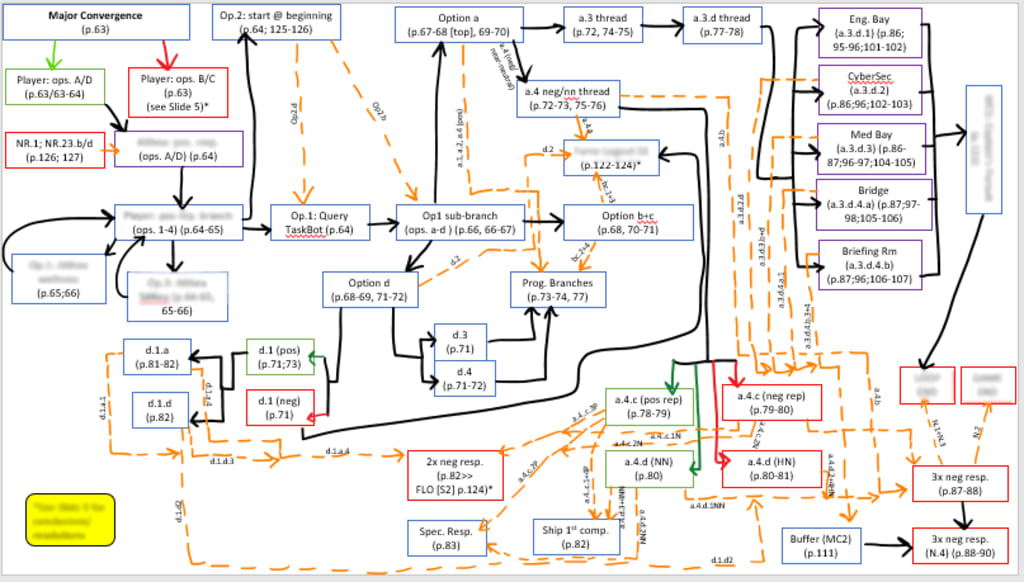Designing the “Reputation” System of the narrative game Loop: The Distress Call
Writing a multiple paths sci-fi story

Loop: The Distress Call is a text-based interactive fiction game that we’ve been working on here at Advenworks for the last three to four years. Players step in the role of an Investigator at Fleet HQ who must handle what seems like a routine distress call from one of the Fleet’s active duty ships. Events unfold in simulated real-time via text message correspondence with the ship’s lone responsive crewmember, Ensign Althea Young. As the game progresses, players must work with Ensign Young to unravel the mystery before them.
Loop is available on iOS & Android.
Of all the features we talk about in Loop — the multiple paths, different endings depending on your choices, a storyline that changes to reflect what you’ve done and uncovered so far — the one that hasn’t had as much limelight is our reputation system. It’s probably because the reputation system is more difficult to talk about quickly and succinctly in 200 characters or less.
As you might have noticed, I put reputation in quotes up there in the headline; that’s because calling it a “reputation system” simply isn’t sufficient.
I got to discuss it briefly (well, as briefly as I could) while chatting with Andre and Jay, but it only scratched the surface. So, strap in and get comfy, everyone; we’re going down the proverbial rabbit hole.
During the early stages of workshopping the game, we knew we didn’t want “just another Choose Your Own Adventure” style of play. We wanted something more. What I came up with were two different types of choices you can make in the game. One is the usual “go here” and “do this” sort of choice. The second, however, is the interpersonal or empathetic choice. This second set arguably has a bigger impact on the number of opportunities and paths that might be available to you because you’re working with and through someone else. The player can only accomplish things and discover clues to aid the investigation if Ensign Young is willing to work with you. You don’t need to be her best friend; she only requires you to listen, to understand, and, most of all, to empathize.
Consider the word “go.” If you use it verbally, there are at least six different ways you can say it with an equal amount of different meanings. An excited one can be encouraging. A reluctant one can impart guilt. An angry one makes the other person run away in fear. In Loop, however, the communications are all text-based. This means all other communication cues we typically rely on as humans to make decisions and responses — inflection, body language, facial expression, pace, breathing, pitch, etc. — are gone.
In the field of anthrolinguistics (the study of speech and language in a cultural/sociological lens), we can delve into the words themselves for insight into what a person means and how they think. You know how a kid might use swear words a lot because they think it makes them sound like a grown-up? (Perhaps you were that kid. *raises own hand guiltily*) Or, you might have even noticed that the way you type an email to your boss is vastly different from texting a friend or even family member. That’s all part of it: an underlying framework that gives insight to how your brain ticks and thinks and processes things — and how you communicate all of that to the world around you.
If you’ve seen the interview and/or have read anything from my blog, you already know I’m a fan of BioWare’s Knights of the Old Republic and Mass Effect universes, as well as Eidos Montreal’s Deus Ex universe. When we started talking about a “reputation system” for Loop, the first thing everyone said was, “BioWare!” For the uninitiated, BioWare is known for games where your playable character can trend toward specific personality profiles (paragon vs. renegade in Mass Effect; Light Side vs. Dark Side in KotOR) with the responses players choose; or gain/lose favor with main non-playable characters (Dragon Age; SWTOR). This was a start, but it certainly needed some depth to it, especially given the scope of what we were trying to achieve.
So, we borrowed some pointers from another well-loved game: Deus Ex: Human Revolution. In DXHR, protagonist Adam Jensen finds that he can’t solve everything by fighting ALL THE THINGS. Sometimes, he has to do some smooth talking to get out of lethal situations and/or obtain crucial information. The conversation options have overall “tones” to them — harsh vs. placating, aggressive vs. laid-back — and it’s up to the player to choose the right thing to say.
On top of that, you may have to change your approach as the conversation progresses; constantly taking the aggressive tack will likely cause the person to shut down, for example. The caveat is that it’s used less as a system and more as a mini game: Can I play the game of Social Skills Simon and win? (If you don’t know what Simon is, here’s the Wiki page on it.) And if you spend the points to activate the CASIE augment, it practically tells you which button to push. It doesn’t necessarily change the direction of the game nor impact it in a huge way any more than choosing between a frontal assault versus stealthy infiltration via air ducts.
Again, I was stuck on requiring something more to add substance to the frame, which, at this point, has been pieced together by hacking apart other systems and taking what we needed. It wasn’t until I was reading stories from fellow public library employees and others entrenched in serving the public that it dawned on me: real people interactions are dynamic and “sticking to one tone” rarely works. In fact, this was something that I struggled with early in my career as a quasi-librarian and worked on it extensively with my head librarian/branch manager. See, one of the fun things about working for the public library is that literally anyone can walk through our front doors. These folks come from all sorts of backgrounds with a myriad of stories that make up whom they are. You have to be ready for any and every personality and attitude. Even interactions with the same patron may vary depending on what sort of day they’ve had or whatever might be going on in their personal lives. Building and maintaining that sort of rapport with the people you serve is crucial to ensuring the community continues to thrive. It takes time, effort, and more than simple canned “customer service” quips to accomplish something more.
I’d finally gotten my answer — and it was sitting right in front of me the entire time.
With this in mind, we started with our protagonist, Ensign Althea Young, her core character traits, and her context; and built Loop’s reputation system around all of it, one layer at a time like a blacksmith forging a sword (or a chef creating parfaits, if you prefer; because everyone loves parfaits). The first couple of layers that made up the groundwork were easy enough to deal with. You’ve just met Ensign Young, so you’re starting at zero. You don’t know her; she doesn’t know you. The only thing both of you know is that the proverbial crap has hit the fan and the clock’s ticking.
I was careful to keep the overall tone and pace of Ensign Young’s first message neutral: straightforward and collected, but with enough speed to give you a sense of urgency given the situation. How is that achieved in a text-based game? By relying on those same anthrolinguistic markers I mentioned before. Back in my undergrad days, I even wrote a paper on the use of text/non-verbal chat and communications in World of Warcraft. (Yes, I found a way to incorporate video games into my coursework. Stop pretending to be shocked.) I’ve seen people spit out chats fast enough to trigger the “You must wait before sending another message” indicator when they’re angry or upset. Guild officers take on a more formal “tone” when discussing business or important matters by writing messages that look more like corporate emails: longer, more complete sentences, formal syntax, all that. Perhaps you’ve seen the meme about the use of exclamation marks in work emails and making sure you use a few so you don’t sound like a robot; but not too many so you don’t sound overly hyper? Yeah, that’s the underlying work precisely.
Now, translate that to an entire game. In your first interaction with Ensign Young — whose name you don’t even know yet — you have four choices. The basic objective of this first interaction is to ask for more information. Referring back to the example of how many meanings the word “go” can have, you now have four ways to go about this and each one has a consequence. And it’s all dependent on how you phrase things. Do you match her candidness and be straightforward with her? Or do you roll your eyes and impose your opinion on the situation? Some of those consequences are immediate; some come back later. As the game goes on, each interaction adds another layer to the reputation parfait. Some missteps can be devastating to what you’ve built up so far, depending on the context and situation; some are more easily forgivable.
Balancing the system proved to be a little tricky since it wasn’t just a matter of adding or taking away from the overall score. Your current overall standing with Althea can impact just how much is added or taken away — in addition to how consequential that particular choice was. You know that really crappy layer you just added by saying the wrong thing at the wrong time because you ignored context? It’s either small and thin, barely registering in the grand scheme of things; or it’s huge and takes up 1/8 of your parfait container. By the time you’re deep into the game, you’re either working really well with Ensign Young and you’ve uncovered lots; or you’ve been stonewalled and haven’t moved very far from Square 1. Or, as it is with most things in life, you’re probably somewhere in between those two extremes.
We’ve joked on more than one occasion that we should have called this Loop: The HR Training Guide; though it’s less about job-related interactions and more to do with how we treat our fellow humans in a much larger scope. Now that mental health has taken a larger (and necessary) role in conversations we have on the world stage, we do have to be cognizant of what we say and how we say it. It’s not “walking on eggshells” around everyone you meet; it’s recognizing that we should be mindful about making good layers rather than crappy layers in our interpersonal parfaits.
Thanks for reading!
Loop is available on iOS & Android.
If you are interested in following the news about Loop, find us on:






Comments
There are no comments for this story
Be the first to respond and start the conversation.